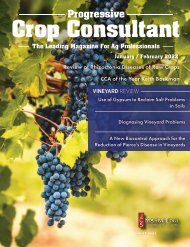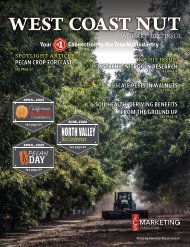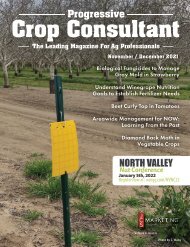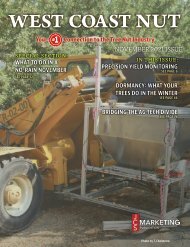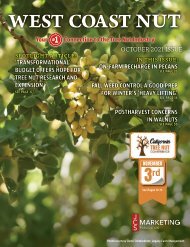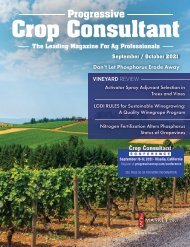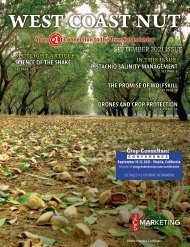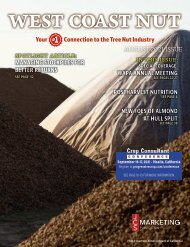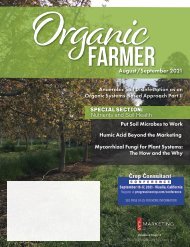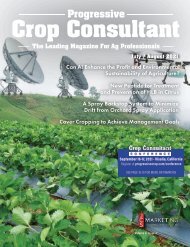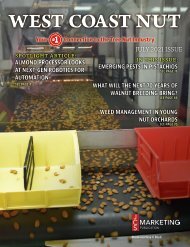WCN Dec e
You also want an ePaper? Increase the reach of your titles
YUMPU automatically turns print PDFs into web optimized ePapers that Google loves.
Continued from Page 21<br />
which would apply to every heavy-duty<br />
vehicle owner. Currently, trucks that<br />
are still operating under the existing<br />
Truck and Bus Regulation are required<br />
to have a Periodic Smoke Inspection<br />
(PSIP) annually. These inspections<br />
measure engine opacity with the<br />
engine running, and if an engine is<br />
found to out of compliance with the<br />
truck’s engine model year opacity<br />
limitation, then the vehicle must have<br />
the necessary repairs done in order to<br />
operate the equipment. Oftentimes, if a<br />
fleet owner is locked out from updating<br />
their Truck and Bus fleet online, CARB<br />
staff will ask for the most recent PSIP<br />
inspection in order to verify mileage.<br />
The proposed updates to the HDVIMP<br />
program will still incorporate PSIP<br />
testing for some model year-specific<br />
vehicles (2010-13), but CARB is looking<br />
to take a more creative approach to ensure<br />
equipment and their emission control<br />
systems are functioning properly.<br />
CARB intends to take advantage<br />
of the technological advancements<br />
made by the equipment manufacturing<br />
industry, specifically the on-board<br />
diagnostic (OBD) systems that are tied<br />
directly into the engine. CARB is proposing<br />
to require fleet/vehicle owners<br />
to take their equipment to a licensed<br />
repair shop twice a year to have their<br />
trucks evaluated. From there, the repair<br />
shop would connect their computer<br />
with the OBD system within the truck.<br />
The repair shop would evaluate all<br />
emission control systems within the<br />
heavy-duty truck as well as monitor<br />
the opacity of the exhaust coming out<br />
of the truck as it is in operation. If any<br />
of the emission control systems show<br />
any sign of failure, a notice will be<br />
issued to the vehicle owner requesting<br />
immediate repair. Fleet/vehicle owners<br />
The intent of the Advanced Clean Truck Regulation is to evaluate larger, heavy-duty<br />
fleets and see where opportunities for electrification could occur.<br />
are given 90<br />
days to repair<br />
the equipment<br />
and bring it<br />
back to the<br />
repair shop to<br />
have the truck<br />
re-evaluated.<br />
Failure to repair<br />
and re-test the<br />
equipment<br />
would result in<br />
CARB notifying<br />
DMV of the<br />
truck’s failure<br />
and a temporary registration hold being<br />
placed on the equipment. Similar to<br />
tactics used in the most recent years of<br />
the Truck and Bus Regulation, CARB<br />
is working directly with the DMV in<br />
order to ensure compliance through<br />
registration holds.<br />
Owner operators would have to<br />
maintain their compliance with the<br />
mandatory inspections as well as keep a<br />
copy of their certificate on file. Vehicles<br />
would also need to be entered into a<br />
separate CARB database. Additionally,<br />
a $30 compliance fee would be included<br />
in a truck owner’s DMV Registration<br />
Renewal invoice. CARB is also looking<br />
for businesses to act as the agencies’ enforcement<br />
inspectors, asking that any<br />
business that contracts any trucking<br />
work ask to see a compliance certificate<br />
with the HDVIMP before beginning<br />
any work, and if one cannot be supplied,<br />
that the contracted trucking<br />
business not be allowed to continue<br />
working at the site.<br />
‘Through the workshop process,<br />
many agricultural associations<br />
have raised the alarm that agricultural<br />
trucking works slightly<br />
different than overall goods<br />
movement.’<br />
Through the workshop process,<br />
many agricultural associations have<br />
raised the alarm that agricultural<br />
trucking works slightly different than<br />
overall goods movement. The seasonality<br />
of agricultural goods movement and<br />
harvest support warrants some consideration<br />
from CARB staff, and truckers<br />
in the agricultural sector should be<br />
identified differently than the intended<br />
target for both regulations. Western<br />
Agricultural Processors Association<br />
along with several other agricultural<br />
organizations and associations has<br />
been active in supplying comments and<br />
working directly with staff to try and<br />
make both of these proposed regulatory<br />
changes more workable for the industry.<br />
Stay tuned for more updates!<br />
Comments about this article? We want<br />
to hear from you. Feel free to email us at<br />
article@jcsmarketinginc.com<br />
22 West Coast Nut <strong>Dec</strong>ember 2021




